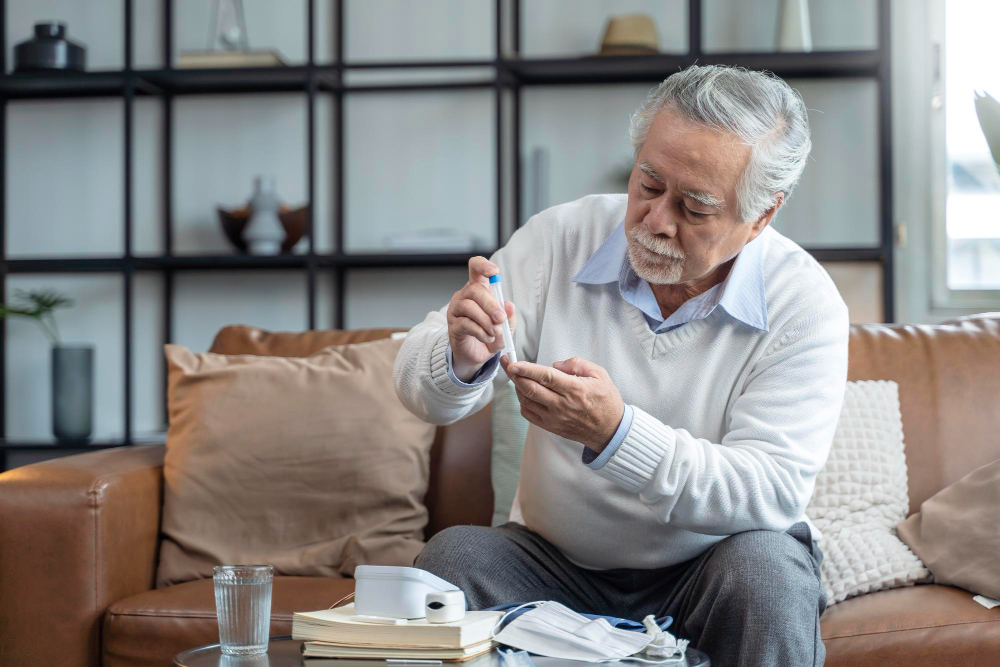
Type 2 diabetes is a chronic metabolic disorder characterized by insulin resistance, a condition where the body's cells become resistant to the effects of insulin, leading to elevated blood sugar levels. Unlike Type 1 diabetes, where the body does not produce insulin, Type 2 diabetes involves a combination of insulin resistance and relative insulin deficiency.
Causes and Risk Factors
Genetics
Family history plays a significant role in the risk of developing Type 2 diabetes. Individuals with close relatives who have diabetes are more likely to develop the condition themselves.
Obesity
Excess body weight, particularly around the abdomen, increases the risk of insulin resistance. Fat cells release inflammatory substances that can interfere with insulin action.
Physical Inactivity
Lack of regular physical activity is strongly associated with an increased risk of Type 2 diabetes. Exercise helps the body use insulin more effectively and can improve overall glucose control.
Poor Diet
Diets high in refined carbohydrates, sugars, and saturated fats can contribute to insulin resistance and obesity, both of which are risk factors for Type 2 diabetes.
Age and Ethnicity
The risk of Type 2 diabetes increases with age, especially after 45 years old. Certain ethnic groups, including African Americans, Hispanics, Native Americans, and Asians, are at higher risk compared to others.
Managing Type 2 Diabetes in seniors
Managing Type 2 diabetes in seniors requires a comprehensive approach that considers their unique healthcare needs, lifestyle factors, and potential complications associated with aging. Seniors with Type 2 diabetes often face challenges such as reduced mobility, cognitive decline, and multiple coexisting medical conditions.
Here are some key strategies for effectively managing Type 2 diabetes in seniors:
Regular Medical Care:
Seniors with Type 2 diabetes should receive regular medical care from healthcare providers experienced in managing diabetes in older adults. Routine check-ups allow for monitoring blood sugar levels, blood pressure, cholesterol levels, kidney function, and other diabetes-related complications. Elder Care Service providers in Kolkata provide Doctor’s Assistance Services in the comfort of home to ensure senior loved ones feel comfortable and stress-free during check-ups.
Medication Management:
Seniors may require multiple medications to manage Type 2 diabetes and other chronic conditions. It's important for healthcare providers to carefully assess medication regimens to minimize the risk of drug interactions and adverse effects. Simplifying medication schedules and using pill organizers or medication management systems can help seniors adhere to their treatment plans.
Lifestyle Modifications:
Encouraging seniors to adopt healthy lifestyle habits can improve blood sugar control and overall well-being. This includes:
Nutritious Diet
Emphasize a balanced diet rich in fruits, vegetables, whole grains, lean proteins, and healthy fats. Limiting the intake of processed foods, sugary beverages, and high-fat snacks can help manage blood sugar levels and prevent weight gain.
Regular Exercise
Encourage seniors to engage in physical activity tailored to their abilities and preferences. Walking, swimming, yoga, and chair exercises can improve insulin sensitivity, cardiovascular health, and muscle strength. Don’t forget to consult their doctors before starting any exercise regime for senior loved ones.
Weight Management
Maintaining a healthy weight is essential for managing Type 2 diabetes. Seniors should work with healthcare providers and dietitians to set realistic weight loss goals and develop sustainable strategies for achieving them.
Blood Sugar Monitoring
Seniors with Type 2 diabetes should monitor their blood sugar levels regularly to track their response to treatment and identify trends over time. Healthcare providers can provide guidance on target blood sugar ranges and the frequency of monitoring based on individual health status and treatment goals.
Foot Care
Foot complications are common in individuals with diabetes, especially seniors with reduced sensation and circulation in their feet. Encourage seniors to inspect their feet daily for signs of cuts, sores, blisters, or infection. Proper foot care, including wearing comfortable shoes and practicing good hygiene, can help prevent serious complications such as foot ulcers and amputations.
Mental Health Support
Living with Type 2 diabetes can be challenging for seniors, particularly if they experience feelings of anxiety, depression, or social isolation. Providing emotional support, connecting seniors with peer support groups, and encouraging participation in social activities can help promote mental well-being and improve overall quality of life. Availing Companionship Services for seniors can greatly enhance their quality of life, promote social interaction, and provide valuable emotional support.
Regular Health Screenings
Seniors with Type 2 diabetes are at increased risk of developing diabetes-related complications such as cardiovascular disease, kidney disease, and vision problems. Regular health screenings, including eye exams, kidney function tests, lipid profiles, and cardiovascular assessments, can help detect and manage these complications early.
Education and support are key components of diabetes management, helping individuals with Type 2 diabetes understand their condition and make informed decisions about their health. Support groups, diabetes educators, and healthcare providers can offer valuable guidance and encouragement along the journey toward better diabetes control in seniors and their overall well-being.